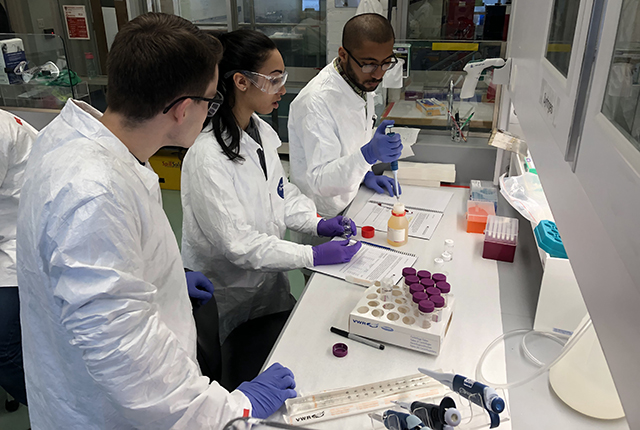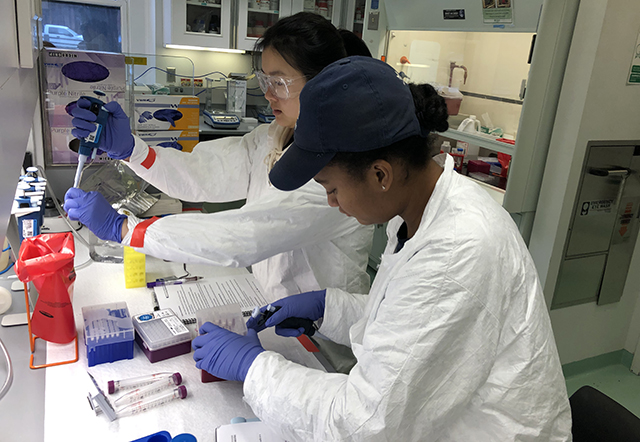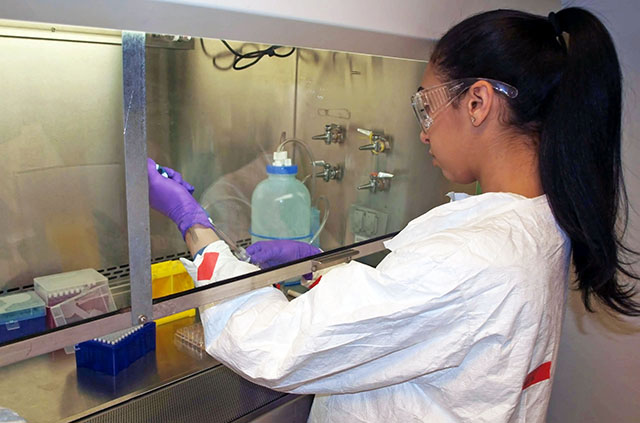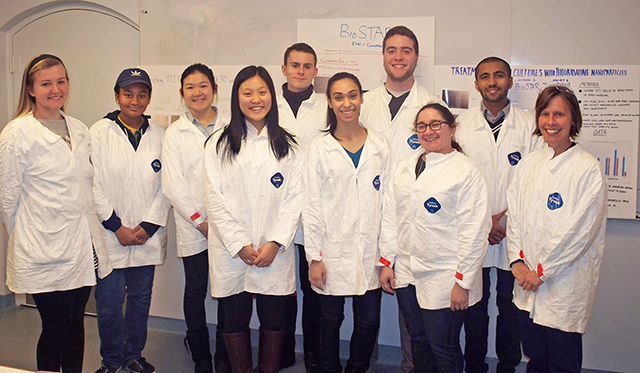News
A group of freshmen had the opportunity to learn scientific principles and bioengineering techniques during BioSTAR, an intensive one-week program hosted by the Active Learning Labs as part of Wintersession.
Students learned to culture mouse mammary cancer lines, image cells with light and fluorescence microscopy, generate drug nanoparticles using microfluidics, and conduct cell viability assays. They then applied those skills to conduct an experiment testing the efficacy of the drug nanoparticles on cell cultures.

(From left) Bjarni Atlason, Sara Recarey, and Mohammed Mutaher are hard at work on a bioengineering project in the Active Learning Labs. (Photo courtesy of the Active Learning Labs.)
The biggest challenge Shelby Elder, A.B. ’22, faced during the intensive lab work was finding cells under the microscope at higher magnifications, which required a great deal of patience.
“Because I have primarily learned about cancer through the lens of cell biology, hearing about the challenges of treating cancer from an engineering perspective was fascinating and introduced me to larger-scale issues, such as tumor pH and irregular vasculature,” she said.

(From left) Meiyi Yu and Shelby Elder collaborate during a BioSTAR lab session. (Photo courtesy of the Active Learning Labs.)
Evan Casalino, A.B. ’22, also developed an appreciation for the field of bioengineering through the BioSTAR program, thanks to the hands-on lab work and the faculty visits and lectures. He also saw how setbacks, such as when experimental data does not turn out as expected, are an all-too-common occurrence that require scientists to remain diligent and creative.
“My biggest lesson from BioSTAR was the importance of being meticulous in science, especially when dealing with live cell cultures,” he said. “Maintaining sterility, creating exact concentrations of solutions, and incubating samples under the proper conductions are all things that could easily be taken for granted, but may lead to disastrous results if ignored. Every detail, down to the last pipette tip, must be accounted for.”

The hands-on BioSTAR lab work helped Sara Recarey (pictured) and her peers learn about key bioengineering techniques. (Photo courtesy of the Active Learning Labs.)
The most poignant lessons Mohammed Mutaher, A.B. ’22, drew from BioSTAR were from faculty lectures, which touched on cancer biology, the history of cancer treatments, and why a bioengineering approach is important. He was surprised by how little scientists truly know about different cancer types and the daunting task of finding effective treatments.
“Cancer is a pressing issue and we must find better treatments to target tumors and prevent them from metastasizing,” he said. “Prior to this program, I was on the fence about pursuing oncology and scientific research, but now I am convinced that it’s what I want to do. There is still so much to learn and so many potential treatments out there. Simply put, the BioSTAR program has inspired me to enlist in the battle against cancer.”

(From left) Eden Tanner (BioSTAR co-director), Shelby Elder, Meiyi Yu, Emily He, Bjarni Atlason, Sara Recarey, Evan Casalino, Michelle Rosen, Mohammed Mutaher, and Melissa Hancock (BioSTAR co-director). (Photo courtesy of the Active Learning Labs)
Topics: Bioengineering
Cutting-edge science delivered direct to your inbox.
Join the Harvard SEAS mailing list.


